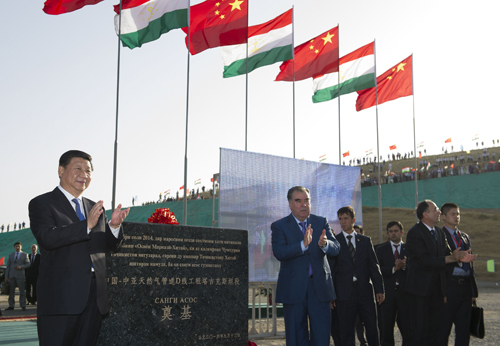|
 |
|
PROJECT INAUGURATION: Chinese President Xi Jinping and his Tajik counterpart Emomali Rahmon attend the groundbreaking ceremony of the Tajikistan section of Line-D of the Central Asia-China gas pipelines in Dushanbe, capital of Tajikistan, on September 13 (HUANG JINGWEN) |
'We are lacking in resources such as oil, weaponry and gold. But, we have a good neighbor—China," said Tajik President Emomali Rahmon in an interview with journalists from China on September 13 during Chinese President Xi Jinping's first state visit to the Central Asian country.
Xi's visit from September 11 to 15 came with the adoption of a five-year development plan for the China-Tajikistan strategic partnership as well as the inauguration of the Tajikistan section of Line-D of the Central Asia-China gas pipelines.
Xu Xiaotian, a senior researcher with the China Institutes of Contemporary International Relations, said that the China-Tajikistan economic relationship is the fastest-growing among China's relations with Central Asian countries.
According to data from China Customs, China is currently Tajikistan's third largest trading partner. Bilateral trade reached $1.96 billion in 2013, up 5.3 percent from the previous year. Tajikistan's official statistics also show that China is currently the second largest investor and the fourth largest donor country to Tajikistan. With loans provided by China under the framework of the Shanghai Cooperation Organization, Tajikistan has completed a lot of construction projects, including the building of a power grid and the upgrading of a major road linking its capital city Dushanbe and the country's second largest city of Khujand in the north.
During Xi's visit, the two sides signed a China-to-Tajikistan direct investment deal worth $5 billion, which President Rahmon praised for potentially creating tens of thousands of jobs for the Tajiks. With Tajikistan enthusiastic about China's Silk Road Economic Belt initiative, President Xi called on the two countries to seize the opportunity to boost cooperation in various fields. The two sides also agreed to strive to increase bilateral trade to $3 billion in five years.
Observers said the Line-D of the Central Asia-China gas pipelines could not only help diversify China's energy import sources, but also benefit Central Asian countries located along the line.
The 1,000-km-long Line-D, one of China's major energy cooperation projects in Central Asia, will run from Turkmenistan across Uzbekistan, Tajikistan and Kyrgyzstan to China, with a planned delivery capacity of 30 billion cubic meters of natural gas every year once completed in 2016. Among all countries the pipeline travels through, Tajikistan has the longest section with about 410 km. Besides Line-D, there are already three pipelines delivering gas from Central Asian countries to China.
The Tajik Government has welcomed the Line-D, which makes Tajikistan a transit country with enough construction and maintenance work being required in the future to create many jobs for the country, said Chen Yurong, a researcher on Central Asian studies with the China Institute of International Studies.
Xu told Beijing Review that the Line-D is highly significant for the economic development of Tajikistan.
"Due to its lack of resources, Tajikistan mainly relies on hydroelectric power generation. The construction of Line-D also promotes the diversification of the country's energy sources," said Xu.
In early 2014, China and Tajikistan set up a joint venture—the China-Tajikistan Gas Pipeline Ltd. Co.—through which the two sides will construct and operate the Tajikistan section of Line-D together. The joint venture has brought employment opportunities for local people and helped increase their incomes.
Besides closer economic relations, China and Tajikistan have been upgrading their level of cooperation since the two countries established a strategic partnership last year.
During Xi's visit, the two countries agreed that enhancing cooperation for interconnection and mutual access will be an important part of the China-Tajikistan strategic partnership. Both sides are also willing to deepen cooperation in border control and the fight against terrorism, drug trafficking and transnational organized crimes. President Rahmon pointed out in his interview with Chinese journalists that "China is not only our great neighbor, but also a strategic partner."
Tajikistan borders Afghanistan, where extremist religious forces are still rampant. Thus Tajikistan presents valuable geopolitical significance for the national security of China, which is also suffering from the "three evil forces" of terrorism, extremism and separatism, Xu said.
Email us at: yulintao@bjreview.com | 